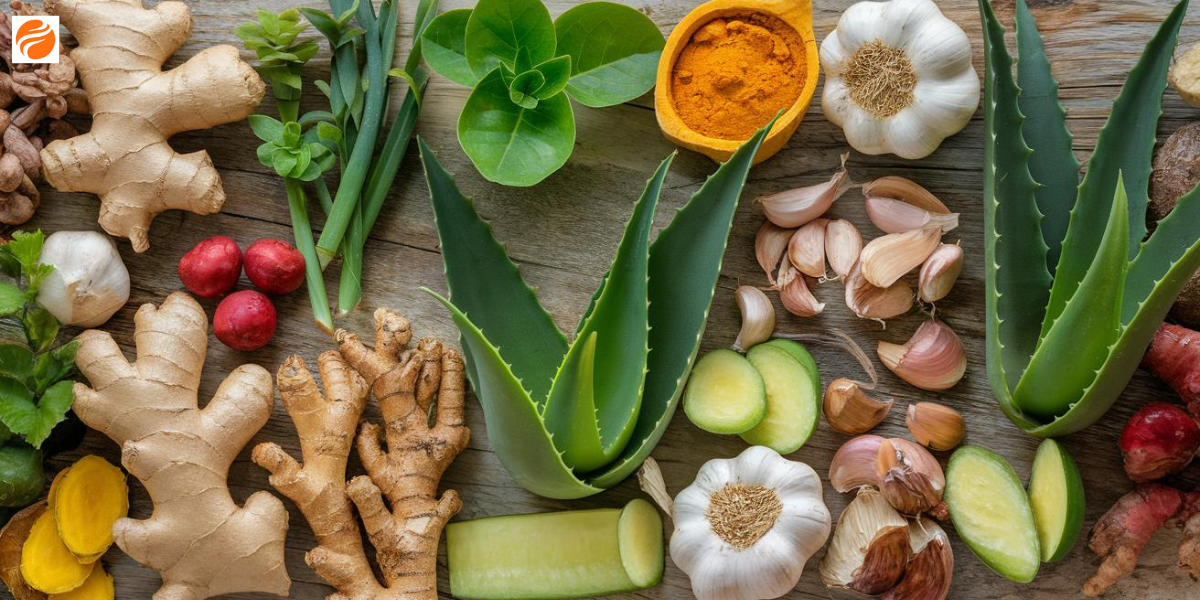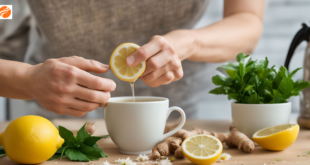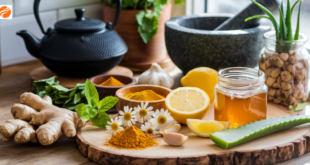
Medicinal plants have been cherished for thousands of years, serving as the foundation of many traditional healing systems. From boosting the immune system to reducing inflammation, these powerful plants offer a wide range of health benefits. In this article, we’ll dive into the top 10 most powerful medicinal plants, exploring their medicinal uses and how they can support a healthy lifestyle.
also read if Interested: Top 10 Home Remedies: Natural Solutions for Everyday Health Problems
Table of Contents
1. Ginger: Nature’s Anti-Inflammatory Superfood
Ginger is one of the most potent medicinal plants, famous for its powerful anti-inflammatory and antioxidant properties. It’s been used in traditional medicine to help reduce nausea, ease digestive issues, and lower blood sugar levels.
Health Benefits:
- Reduces inflammation
- Helps with nausea and vomiting
- May improve heart health by lowering blood sugar
2. Turmeric: The Golden Spice with Curcumin Power
Turmeric, loaded with the active compound curcumin, is a popular medicinal plant known for its anti-inflammatory, antioxidant, and potential cancer-fighting properties. Its bright yellow hue has been a staple in both cooking and Ayurvedic medicine for centuries.
Health Benefits:
- Reduces chronic inflammation
- Supports brain health
- May lower the risk of heart disease
3. Garlic: The Heart-Healthy Herb
Garlic isn’t just a kitchen favorite; it’s also a medicinal powerhouse. With its bioactive compounds like allicin, garlic is known for boosting the immune system, lowering blood pressure, and reducing the risk of cardiovascular disease.
Health Benefits:
- Lowers blood pressure and cholesterol
- Boosts the immune system
- Has antimicrobial properties
4. Peppermint: The Cooling Digestive Aid
Peppermint is another medicinal plant revered for its soothing properties. It’s most commonly used to relieve digestive issues like indigestion and irritable bowel syndrome (IBS), thanks to its active ingredient, menthol.
Health Benefits:
- Eases digestive discomfort
- Relieves headaches
- Acts as a natural decongestant
5. Echinacea: The Immune-Boosting Plant
Echinacea is a widely known herb for its ability to stimulate the immune system and help prevent or treat colds and flu. This powerful plant has been a staple in herbal medicine for centuries.
Health Benefits:
- Boosts the immune system
- Reduces symptoms of respiratory infections
- Helps fight inflammation
6. Aloe Vera: The Skin-Soothing Miracle Plant
Aloe Vera is often hailed for its skin-healing properties. Its gel-like substance has been used to treat burns, wounds, and various skin conditions. Aloe also contains compounds that aid digestion and boost immunity.
Health Benefits:
- Soothes burns and skin irritations
- Aids in digestion
- Boosts the immune system
7. Ginseng: The Energy-Boosting Adaptogen
Ginseng is a popular medicinal herb used for its adaptogenic properties, meaning it helps the body resist stress. It’s often consumed to boost energy, enhance cognitive function, and strengthen the immune system.
Health Benefits:
- Increases energy levels
- Enhances brain function
- Strengthens immune health
8. Chamomile: The Calming Sleep Herb
Chamomile is well known for its calming and sedative properties, making it an excellent remedy for insomnia and stress. It’s also used to soothe upset stomachs and ease muscle tension.
Health Benefits:
- Promotes relaxation and sleep
- Relieves digestive issues
- Eases anxiety and stress
9. Lavender: The Stress-Relieving Flower
Lavender is another calming herb, often used in aromatherapy to reduce stress and anxiety. Its pleasant scent and soothing properties make it a popular choice for promoting relaxation and improving sleep quality.
Health Benefits:
- Reduces stress and anxiety
- Promotes restful sleep
- Helps with skin irritations
10. Rosemary: The Memory-Enhancing Herb
Rosemary is more than just a flavorful herb in the kitchen. It’s been traditionally used to enhance memory and concentration. Some research suggests that the aroma of rosemary may improve cognitive performance and mood.
Health Benefits:
- Boosts memory and concentration
- Contains antioxidants
- Supports digestion
Conclusion: Embrace the Power of Medicinal Plants for Better Health
Medicinal plants have played a crucial role in promoting health and well-being for thousands of years. Whether you’re looking to boost your immune system, reduce inflammation, or improve digestion, these powerful herbs can offer natural and effective remedies. Integrating these plants into your daily routine can help support a healthier, more balanced lifestyle.
for more info click here
FAQs
1. Are medicinal plants safe to use every day?
While many medicinal plants are safe for daily use, it’s always best to consult with a healthcare provider before incorporating them into your routine, especially if you’re pregnant, breastfeeding, or taking medications.
2. How can I use medicinal plants?
Medicinal plants can be used in a variety of forms, including teas, supplements, essential oils, and topical applications like creams or gels.
3. Can medicinal plants replace prescription medication?
Medicinal plants can complement modern medicine, but they should not replace prescribed treatments without guidance from a healthcare professional
 Health live a Healthy life
Health live a Healthy life








2 comments
Pingback: 10 Best Natural Remedies for Anxiety: Herbal and Lifestyle Solutions for Stress Relief
Pingback: Top 10 Home Remedies: Natural Solutions for Everyday Health Problems